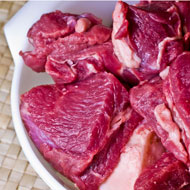
New figures released after campaign pressure
Nearly a quarter of non-stun sheep meat is exported outside of the UK, according to government figures released after pressure from campaigners.
The survey by the Food Standards Agency shows that in 2018, over 94 million cattle, sheep and poultry were slaughtered without being stunned first. Around 750,000 sheep (24 per cent) were slaughtered without prior stunning, for consumption outside the domestic market.
Under current legislation, non-stun slaughter is allowed in certain religious communities in the UK. However, the derogation is intended to meet domestic demand only.
Whilst most of this meat is intended for EU markets, the BVA said the data raises questions about where the remaining non-stun meat is sent.
The survey also revealed a lack of transparency with some exports - for example 19 per cent of sheep meat was recorded as being destined for ‘unknown’ locations. According to the results, this lack of information is down to abattoirs leaving non-mandatory questions blank.
Survey results were expected in autumn 2018. Following campaigning by the BVA and the RSPCA, in addition to a parliamentary question from Kerry McCarthy MP, the government agreed to release the figures after consulting with religious groups.
The BVA is calling for a ban on all non-stun slaughter in the UK on welfare grounds. However, while the practice continues, the government is being urged to end the export of non-stun meat, as the legislation is intended to meet UK demand only.
BVA president Simon Doherty said: “The fact that nearly a quarter of non-stun sheep meat is being exported is highly significant, and we believe this goes against the spirit of the derogation that allows for non-stun slaughter purely for consumption by particular communities within the UK.
“It’s equally concerning that the export of some non-stun meat is going unreported, with a lack of clarity around where seven per cent of non-stun sheep meat is ending up due to incomplete slaughterhouse data.
"While we’re pleased that the data has finally been made available thanks to joined-up work between the FSA and English and Welsh governments, clearly there is still a lot of work to do around ensuring that data is as robust and transparent as possible.”



 The RCVS has announced a new version of its 1CPD mobile app, with enhanced features for veterinary surgeons and veterinary nurses to record their continuing professional development.
The RCVS has announced a new version of its 1CPD mobile app, with enhanced features for veterinary surgeons and veterinary nurses to record their continuing professional development.